|
|
|
Sort Order |
|
|
|
Items / Page
|
|
|
|
|
|
|
| Srl | Item |
| 1 |
ID:
183671
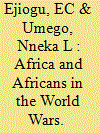

|
|
|
|
|
| Summary/Abstract |
This article argues that there is a set twin repertoires of coercion and violence that consistently characterized Europe’s involvement in Africa starting with its trans-Atlantic slave trade in which millions of able-bodied Africans were transported against their will to the New World where they were forced to labor as chattels in plantations, through the trade in produce commodities, conquest, and de facto occupation of the continent to the two World Wars when African commodity produce and manpower were impressed and utilized in the win the war efforts. Both repertoires remain handy all through the above-listed endeavors, and without them, it could have been extremely impossible for Europeans to successfully pull each one of them off. An analysis that factors both repertoires in reveals that the era of conquest and occupation of Africa flowed seamlessly into the era of World War I when the European powers that colonized Africa relied on them to impress Africans as manpower for its win the war efforts. For one to better understand each of the six endeavors, one needs to understand all six.
|
|
|
|
|
|
|
|
|
|
|
|
|
|
|
|
| 2 |
ID:
183678


|
|
|
|
|
| Summary/Abstract |
Histories and stories of Europe’s two “World” Wars are generally centered on narratives that privilege metropolitan empire perspectives over the perspectives of their satellite countries and their societies. As Spivak correctly observes, European and American academic writing is produced to support the economic interests of these countries. Similarly, knowledge or information is never innocent as it expresses the interests of its producers. It has invariably been in the interest of Eurocentric academic chroniclers of the Europe’s “World” Wars to write Africa’s contributions out of the dominant narratives of those wars. Just like European military regiments containing African soldiers and soldiers of African descent, who fought in Europe’s second “World” War and enabled Allied Powers’ victory over Nazi Germany and its Axis Powers allies, were “bleached” off every post-victory battle photographs of the War, the dominant narratives of the two “World” Wars are “bleached” to rid them of Africa’s economic contributions to the successful prosecution of both wars. This article represents an intervention to de-center such dominant albeit erroneous narratives on both wars. It brings focus on Africa’s economic contributions to the war efforts with the underscoring argument that but for Africa’s economic contributions, Africa’s European colonizers could not have achieved victory over Germany in both wars. The article advocates a de-centering agenda, which stems from postcolonial studies and theoretical framework as a useful tool for such corrective scholarship endeavor. The conclusive argument is that Africa’s economic contribution to the successful prosecution of Europe’s “World Wars” is primarily phenomenal rather than epiphenomenal.
|
|
|
|
|
|
|
|
|
|
|
|
|
|
|
|
| 3 |
ID:
183675
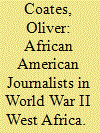

|
|
|
|
|
| Summary/Abstract |
The National Negro Publishers Association (NNPA) Commission to West Africa in 1944–1945 represents a major episode in the history of World War II Africa, as well as in American–West Africa relations. Three African American reporters toured the Gold Coast, Sierra Leone, Nigeria, Liberia, and the Congo between November 1944 and February 1945, before returning to Washington, DC to report to President Roosevelt. They documented their tour in the pages of the Baltimore Afro-American, the Chicago Defender, and the Norfolk Journal and Guide. Their Americans’ visit had a significant impact in wartime West Africa and was widely documented in the African press. This article examines the NNPA tour geographically, before analyzing American reporters’ interactions with West Africans, and assessing African responses to the tour. Drawing on both African American and West African newspapers, it situates the NNPA tour within the history of World War II West Africa, and in terms of African print culture. It argues that the NNPA tour became the focus of West African hopes for future political, economic, and intellectual relations with African Americans, while revealing how the NNPA reporters engaged African audiences during their tour.
|
|
|
|
|
|
|
|
|
|
|
|
|
|
|
|
| 4 |
ID:
183672
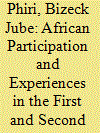

|
|
|
|
|
| Summary/Abstract |
Unlike existing studies that examined each of the two World Wars and Africans separately, this study explores African participation and experiences in the First and Second World Wars in Northern Rhodesia (colonial Zambia) together during the period, 1914–1948. A lot has been written on the history of the World Wars in colonial Africa. However, there is not much literature that focuses on African participation and experiences during the two world wars. This study is focused on the core theme, that is, the role played by Africans in both World Wars. This is the main theme that informs the study. The core theme is sub-divided into the following three sub-themes: the making of the Northern Rhodesia Police under the British South African Company, BSACo, a Chartered Company that prohibited by law from housing a standing; recruitment of personnel for the Northern Rhodesia Regiment; the role played by traditional authorities in the recruitment of ‘Askari’ – the Foot Soldiers and the ‘Tenga-Tenga’ War Carriers and the role of government propaganda while bringing to the fore African agency during both Wars. Also discussed in the study is the demobilisation process in which African servicemen – the Foot Soldiers and the ‘Tenga-Tenga’ War Carriers – felt cheated by an Empire-wide system of racial discrimination and hierarchy. Although an expanded government propaganda machinery contributed to the growth of an African political voice in Northern Rhodesia during the period, 1914–1948, that political voice neither included nor translated to much debate or discussion about the concerns of African ex-servicemen and their personal affairs. The study equally examines how their state of affairs affected the relationship between the ex-servicemen and their traditional leaders who were active in the recruitment process that brought them into the Wars in the first place. The study concludes with the re-examination of the older arguments that African servicemen did not play an active role in nationalist politics after the World Wars, and submits otherwise, that is, that they actually did.
|
|
|
|
|
|
|
|
|
|
|
|
|
|
|
|
| 5 |
ID:
183669
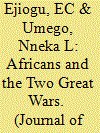

|
|
|
|
|
| Summary/Abstract |
Historically, the World Wars represented different realities for the different countries, nay nations and peoples that participated in them. Just recently, in their online daily weekday newsletter, The Morning, of September 10, 2021 a New York Times writer, David Leonhardt, observed, inter alia, that for America, “World War II helped spark the creation of the modern middle class and cemented the so-called American Century.”1 Leonhardt’s assertion are in the positive realm. For Africans, who were still subject peoples to the European powers that colonized them when both World Wars were waged, the story of the realities that they represented is most complicated, especially if it is viewed critically. Even then, any critical assessment of the two wars vis-a-vis Africa and its peoples will reveal that such a complicated story is a part of the extensive trajectory of the exploitation of the continent, its vast resources, and peoples by the former. This article and the Special Issue of the Journal of Asian and African Studies where it’s published, crack open a dedicated discourse on Africans and the World Wars by a select list of scholars who contributed articles to the Special Issue.
|
|
|
|
|
|
|
|
|
|
|
|
|
|
|
|
| 6 |
ID:
183670
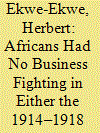

|
|
|
|
|
| Summary/Abstract |
The wars of 1914–1918 and 1939–1945 are without parallel in the expansive stretch of decades of the pan-European conquest and occupation of Africa in creating such profound opportunity to study the very entrenched desire by the European conqueror-states in Africa to perpetuate their control on the continent and its peoples indefinitely. The two principal protagonists in each conflict, Britain and Germany, were the lead powers of these conqueror-states that had formally occupied Africa since 1885. Against this cataclysmic background of history, Africans found themselves conscripted by both sides of the confrontation line in 1914–1918 to at once fight wars for and against their aggressors during which 1 million Africans were killed. Clearly, this was a case of double-jeopardy of conquered and occupied peoples fighting for their enemy-occupiers. In the follow-up 1939–1945 war, when Germany indeed no longer occupied any African land (having been defeated in the 1914–1918 encounter), Britain and allies France and Belgium (all continuing occupying powers in Africa) conscripted Africans, yet again, to fight for these powers in their new confrontation against Germany, and Japan, a country that was in no way an aggressor force in Africa. Hundreds of thousands of Africans were killed in this second war. In neither of these conflicts, as this study demonstrates, do the leaders of these warring countries who occupied (or hitherto occupied) Africa ever view their enforced presence in Africa as precisely the scenario or outcome they wished their own homeland was not subjected to by their enemies. On the contrary, just as it was their position in the aftermath of the 1914–1918 war, Britain, France, Belgium, Spain and Portugal in 1945 each envisaged the continuing occupation of the states and peoples of Africa they had seized by force prior to these conflicts. Winston Churchill, the British prime minster at the time, was adamant: ‘I had not become the king’s first minister in order to preside over the liquidation of the British Empire’. Charles de Gaulle, leader of the anti-German ‘free French forces’, was no less categorical on this score: ‘Self-government [in French-occupied Africa, Asia, the Caribbean, South America, the Pacific and elsewhere in the world] must be rejected – even in the more distant future’.
|
|
|
|
|
|
|
|
|
|
|
|
|
|
|
|
| 7 |
ID:
183674
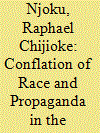

|
|
|
|
|
| Summary/Abstract |
The primary focus here is to accentuate the competing roles of race and propaganda in the enlistment of Africans and African Americans for the Second World War. Among other things, the discussion captures on the interwar years and emphasizes the subtleties of African American Pan-Africanist discourses as a counterweight to Black oppression encountered in the racialized spaces of Jim Crow America, colonized Africa, and the pugnacious infraction that was the Italo-Ethiopian war of 1935–1936. Tying up the implications of these events into the broader global politics of 1939–1945 establishes the background in which the Allied Powers sought after Black people’s support in the war against the Axis Powers. Recalling that Italy’s fascist leader Benito Mussolini attacked Ethiopia in 1935 with poisonous gas while the League of Nations refused to act, points to the barefaced conflation of race and propaganda in the Great War and the centrality of African and African Diaspora exertions in the conflict.
|
|
|
|
|
|
|
|
|
|
|
|
|
|
|
|
| 8 |
ID:
183677
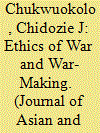

|
|
|
|
|
| Summary/Abstract |
Wars are cataclysmic events that inflict horrendous damage on people and society. In the case of the two World Wars whose magnitudes were global, and manners of prosecution total, this assertion pales in logic. The dangers that a future global war could pose for humanity given the tremendous leaps forward in the science and technology of warfare and weapons since the last World War are tremendous. This paper aims to use the examination of the ethics of war and warfare as backdrop on the analytical assessment of the implications of the exclusion of Africans from both the memorial and monuments that honor soldiers and their service in the two World Wars, even though their service and sundry contributions are salient and tremendous. The paper calls up the issue of racial identity in both Wars in puzzles: Do African soldiers in the Wars share a common humanity with their White counterparts? If they do, another puzzle is the following: Why then is their service still being commodified, to the extent of exclusion in memorials and monuments to soldiers that served and died in both Wars? The damning extrapolation from these puzzles is that there is still the belief albeit erroneous, in the establishment circles that regardless of the facts of history about the Wars, Africans are still viewed as lacking in contributions to the resolution of the threats that the World Wars represented to global peace. To reposition that under laying mind-set, the paper recommends the inclusion of African values of complementarity and inclusiveness in the quest for lasting global peace and the prevention of future Wars.
|
|
|
|
|
|
|
|
|
|
|
|
|
|
|
|
| 9 |
ID:
183679
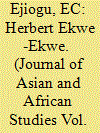

|
|
|
|
|
| Summary/Abstract |
The brilliant and erudite scholar and public intellectual of the state, genocide and ‘wars in Africa in the post-1966 epoch, beginning with the Igbo genocide, 29 May 1966 to 12 January 1970’, which he aptly designated as ‘the foundational and most gruesome genocide of post (European) conquest Africa’, Herbert Ekwe-Ekwe, who passed in 17 October 2019, was one of the select slate of scholars who were invited to contribute to this Special Issue of the journal. Characteristic of him and his dedication to the seriousness of purpose in scholarship, he was the first to complete and submit his contributed piece, which appears here in the Special Issue under the title, ‘Africans had no business fighting in either the 1914–1918 war or the 1939–1945 war’. That was a mere 4 months prior to his passing. This is a deserving tribute to him that captures his scholarship in all of its essence and complexity – Ekwe-Ekwe wrote more than 15 insightful books and published numerous articles in top-ranked academic journals and general interest publications in both the English and Portuguese languages, all of which are well-received in the communities of scholars and lay people. Rethinking Africa is the ‘forward looking blog’ that he founded and ‘dedicated to the exchange of innovative thinking on issues affecting the advancement of African peoples wherever they are’. It is indeed a medium that he used to provide ‘rigorous and insightful analyses on the issues affecting Africans and their vision of the world’. He was until his transition a ‘visiting professor in graduate programme of constitutional law at Universidade de Fortaleza, Brazil’.
|
|
|
|
|
|
|
|
|
|
|
|
|
|
|
|
| 10 |
ID:
183673


|
|
|
|
|
| Summary/Abstract |
Africa’s involvement in World War I presents the researcher with challenges that few researchers of the Western Front are likely to encounter. The centenary years of the War have seen a range of publications on the conflict in Africa: from Marike Sherwood who claims little has been written on Africa’s involvement to others who have tended to rely on online articles that are limited in scope and draw on dated publications, thereby perpetuating myths. A handful of researchers are breaking new ground through their accessing of archival material. Authors such as David Killingray and Joe Lunn, writing on West Africa over two World Wars, unwittingly set the scene for how Africa as a whole has been perceived. However, an outcome of the centenary commemorations of the War has been new and varied insights to Africa’s contributions, not least the different approaches taken by Africans and non-Africans, academic and enthusiast, and those interested in the conflicts of French (West) Africa and the rest of Africa. Engagement with the diaspora and people from the across the continent has reinforced the diversity of Africa in contrast to the published narratives and interpretations of the war which have generally been homogeneous in their approach. This study provides an opportunity to explore recent historiographical developments of the war in Africa. In particular, it aims to show that by treating Africa as a single entity (‘Africa is a country’), misconceptions have been perpetuated and experiences of World War II conflated with those of World War I. In addition, the complexities, challenges and rewards of researching Africa’s involvement in World War I are highlighted in the article.
|
|
|
|
|
|
|
|
|
|
|
|
|
|
|
|
| 11 |
ID:
183676
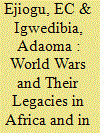

|
|
|
|
|
| Summary/Abstract |
This article drew from prominent Kenyan novelist-writer, Ngúgí wa Thiong’o’s personal history on the World Wars and their legacies in Africa and on the affairs of Africans, with a focus on East Africa, and especially his country of Kenya. Ngúgí, whose birth in 1938 and childhood years were on the cusp of the World War II (WWII), reveals that the likes of his father who dodged conscription into Britain’s Carrier Corps in the first War, and the conscription of his two elder brothers—one of whom died in service while the other returned home alive—for military service in WWII constitute significant and relevance issues for careful exploration on the subject matter of both World Wars and their legacies on the African continent. So are the various actors whose advent as actors in the affairs of Africans and others in East Africa is directly linked to World Wars I and II. Those would include the likes of Carey Francis, who came on in 1940 as the principal of the exclusive all-boys Alliance High where a generation of Kenyans that included Ngúgí received British-style public school education, Evelyn Baring, the then colonial governor-general of Kenya who superintended the imposition of the State of Emergency in Kenya, in the period 1952–1959, and even Idi Amin, a rank and file African enlistee in the King’s African Rifles (KAR) in the aftermath of the World War II. Amin and his ilk were deeply involved in the highly repressive British-led campaign during the State of Emergency in Kenya that led to the death of many of their fellow Africans. It is also noteworthy that as a soldier and subsequently, Amin became a central actor in the politics of post-independence Uganda sequel to his overthrow of Milton Obote’s government in a 1971 military coup d’état. The spiraling violence that Amin’s advent enhanced in Uganda’s body politic remains a recurrent feature of governance in that East African state. The analytical reconstruct that emerged in the article is illuminated with elements of C. Wright Mills’ age-old and all-time relevant original theory-rich methodological construct, “the sociological imagination” as the theoretical framework.
|
|
|
|
|
|
|
|
|
|
|
|
|
|
|
|
|
|
|
|
|